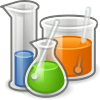
Chemistry

Chemistry is the scientific discipline involved with elements and compounds composed of atoms, molecules and ions: their composition, structure, properties, behavior and the changes they undergo during a reaction with other substances. In the scope of its subject, chemistry occupies an intermediate position between physics and biology. It is sometimes called the central science because it provides a foundation for understanding both basic and applied scientific disciplines at a fundamental level. For example, chemistry explains aspects of plant chemistry (botany), the formation of igneous rocks (geology), how atmospheric ozone is formed and how environmental pollutants are degraded (ecology), the properties of the soil on the moon (astrophysics), how medications work (pharmacology), and how to collect DNA evidence at a crime scene (forensics). Chemistry addresses topics such as how atoms and molecules interact via chemical bonds to form new chemical compounds. There are four types of chemical bonds: covalent bonds, in which compounds share one or more electron(s); ionic bonds, in which a compound donates one or more electrons to another compound to produce ions (cations and anions); hydrogen bonds; and Van der Waals force bonds. The word chemistry comes from alchemy, which referred to an earlier set of practices that encompassed elements of chemistry, metallurgy, philosophy, astrology, astronomy, mysticism and medicine. It is often seen as linked to the quest to turn lead or another common starting material into gold, though in ancient times the study encompassed many of the questions of modern chemistry being defined as the study of the composition of waters, movement, growth, embodying, disembodying, drawing the spirits from bodies and bonding the spirits within bodies by the early 4th century Greek-Egyptian alchemist Zosimos. An alchemist was called a 'chemist' in popular speech, and later the suffix '-ry' was added to this to describe the art of the chemist as 'chemistry'. The modern word alchemy in turn is derived from the Arabic word al-kīmīā (الكیمیاء). In origin, the term is borrowed from the Greek χημία or χημεία. This may have Egyptian origins since al-kīmīā is derived from the Greek χημία, which is in turn derived from the word Kemet, which is the ancient name of Egypt in the Egyptian language. Alternately, al-kīmīā may derive from χημεία, meaning 'cast together'. The current model of atomic structure is the quantum mechanical model. Traditional chemistry starts with the study of elementary particles, atoms, molecules, substances, metals, crystals and other aggregates of matter. This matter can be studied in solid, liquid, or gas states, in isolation or in combination. The interactions, reactions and transformations that are studied in chemistry are usually the result of interactions between atoms, leading to rearrangements of the chemical bonds which hold atoms together. Such behaviors are studied in a chemistry laboratory. The chemistry laboratory stereotypically uses various forms of laboratory glassware. However glassware is not central to chemistry, and a great deal of experimental (as well as applied/industrial) chemistry is done without it. A chemical reaction is a transformation of some substances into one or more different substances. The basis of such a chemical transformation is the rearrangement of electrons in the chemical bonds between atoms. It can be symbolically depicted through a chemical equation, which usually involves atoms as subjects. The number of atoms on the left and the right in the equation for a chemical transformation is equal. (When the number of atoms on either side is unequal, the transformation is referred to as a nuclear reaction or radioactive decay.) The type of chemical reactions a substance may undergo and the energy changes that may accompany it are constrained by certain basic rules, known as chemical laws.
